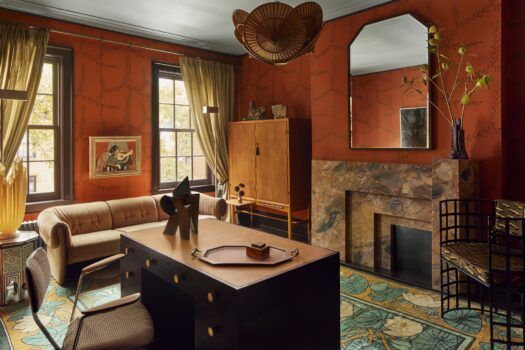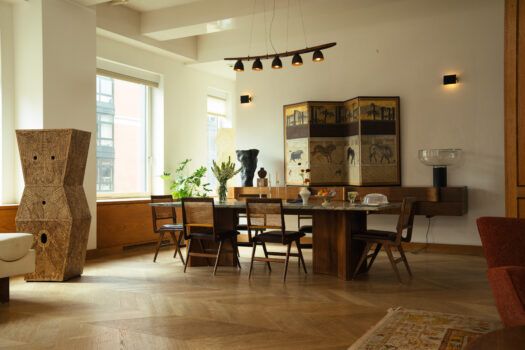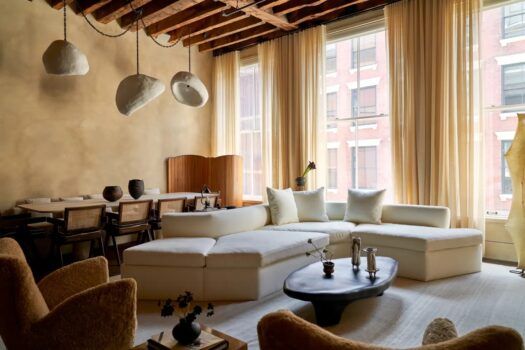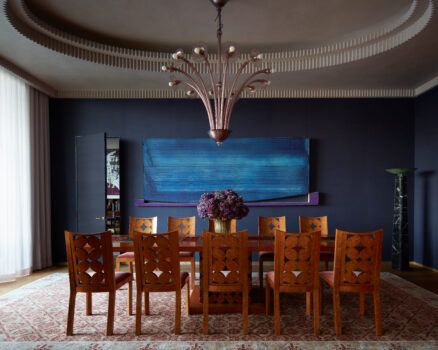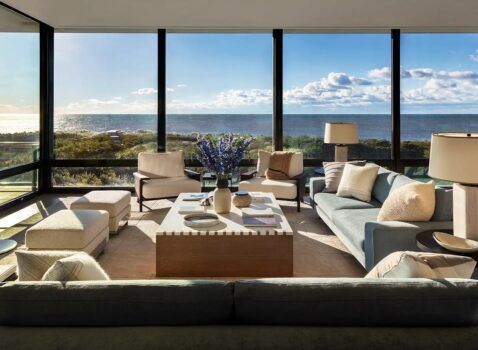New Year’s resolutions have been around for a whopping 4,000 years. The ancient Babylonians celebrated the New Year with a spring festival in which they made promises to the gods to pay debts (and to all-around, be good). Fast forward to 46 B.C. and Julius Caesar rejiggered the calendar so the year would start in January to honor the Roman god Janus (the god of beginnings and defender of the home and hearth). Clearly Caesar’s swap was a success that has stuck. Modern-day resolutions continue the ancient theme of January declarations of renewal. This January, in a nod to Janus, make a resolution to refresh your own home and hearth. We spoke to several psychologists for some expert tips on how strategic décor updates can do wonders to granting mindfulness. A January with a dash of serenity and a more spatial-feeling interior to boot? Sounds like a Happy New Year to us.
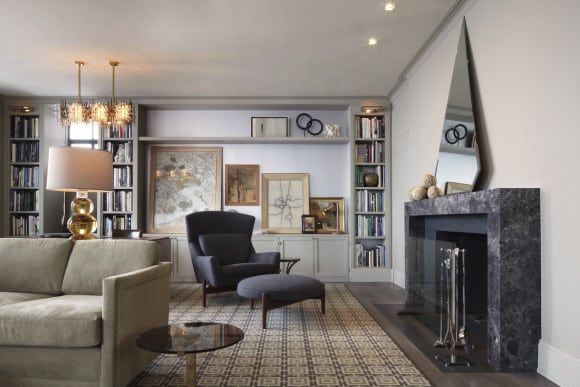
Janson Goldstein organized and edited this collection of books, photography and objects.
The Right Stuff
“Arrange your environment to help, rather than hinder you,” says John Norcross, PhD, a clinical psychologist at the University of Scranton who has been studying resolution making (and breaking) for decades. It’s key to fill your home with strategic furnishings and décor that are useful and emotionally satisfying. Amy Wood, Psy.D defines these as items that are “absolutely necessary and most meaningful. Photos of your loved ones to honor the past, or objects from nature to remind you of the calming natural world.” Wood warns against holding on to the wrong things. “Throw out anything that reminds you of mistakes you’ve made,” says Wood, “Also get rid of anything you are keeping out of guilt, like a wedding gift.”
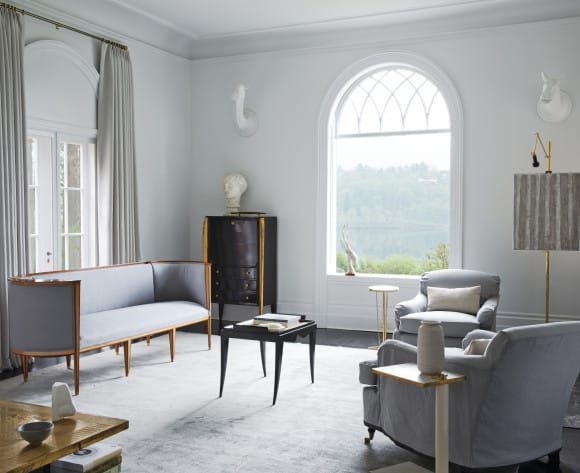
A light-filled sitting room by Windsor Smith.
Let There Be Light
Lighting is a prized commodity in any interior, and more crucial than ever in the depths of a January winter. “Lighting is very much related to mood,” says Wood. She recommends investing in bulbs that mimic natural light and to avoid fluorescent lights at all costs as they are “apt to make people feel depressed and anxious.” It is crucial to pick and choose lighting schemes tailored to various spaces in the home. Dimmers are ideal for a living room or den to be conducive to winding down for the day, while brighter lighting is crucial in workspaces, such as the kitchen or office. Wood is a firm believer in eschewing electricity from time to time. “Eating by candlelight promotes intimacy and creates a sense of warmth,” she says, “It reminds us of times of long ago when we were not so rushed and distracted.”
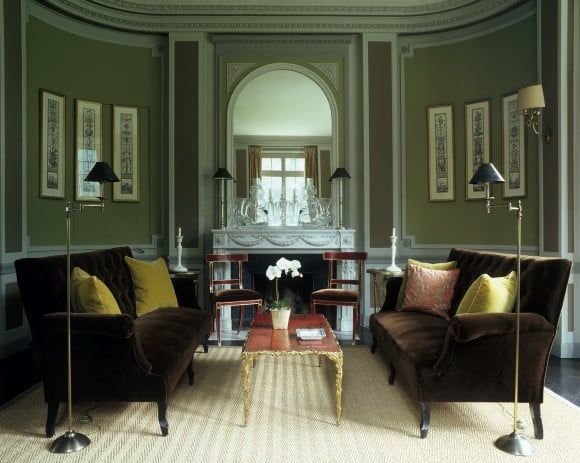
A mirror creates the illusion of extra space in this Jean-Louis Deniot-designed living room.
Small and Mighty
Little changes can do wonders to giving an existing space a significant spatial refresh. Joseph Ferrari, PhD, a professor of psychology at DePaul University cautions that dramatic remodeling is not necessarily always the right answer. “Shifting furnishings around and staging them differently can feel like a renewal,” says Ferrari. He finds the kitchen to be a ripe staging ground for a revamp. Fixes like putting new knobs on cabinets or giving door faces a fresh coat of paint can do wonders. And it’s a whole lot less invasive (not to mention less stressful) than redoing countertops, Ferrari says. Newness can be injected in small ways throughout the home as well. In a narrow hallway, adding a mirror is an instant way to fake a square footage upgrade.
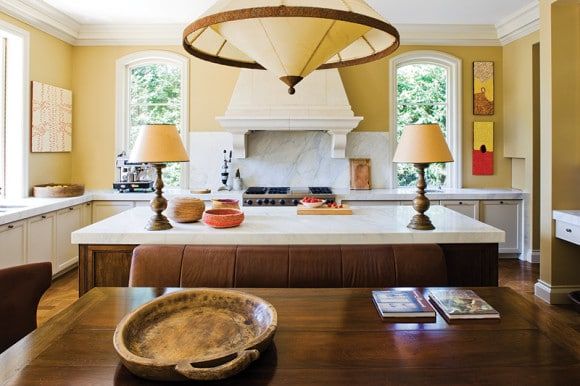
A sunny-hued Melbourne, Australia kitchen by interior designer Thomas Hamel.
Consider Colors
While color preference is a matter of taste, it is undeniable that certain shades trigger specific emotional responses. “Generally soft blues and greens, which mimic nature, are the most relaxing,” says Wood. It is imperative to let the function of the space guide color choices. She suggests bright yellow (“an energizing color”) for the kitchen where you want to feel motivated to cook. And for the bedroom Wood likes soft beige, a hue that lends itself to helping one “let go and relax.”
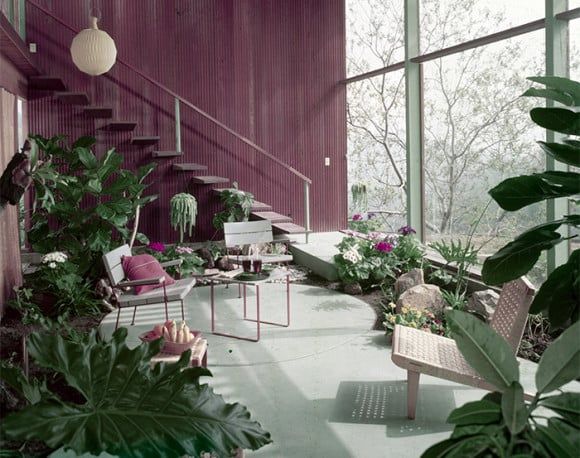
The Knauer house, designed by Rodney Walker, is filled with plants like philodendron. Photo by Julius Shulman,
Natural Attraction
Break down the divide between the outside and in. “Studies have shown that just a few minutes outside can boost someone’s mood, which means that nature is integral to well-being,” says Wood. Bringing flowers or plants into the home is the natural solution, but it’s not necessary to be a green thumb. To get a similar mood boost, Wood recommends paintings of nature, natural objects (“a beautiful plate of sea glass, an interesting piece of driftwood, a bowl of stones”).
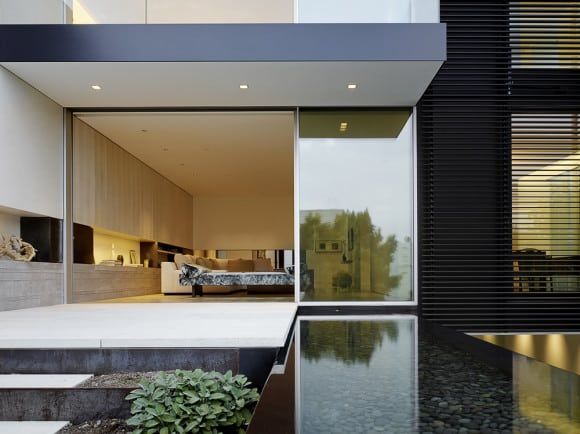
Architecture firm Aidlin Darling created a reflecting pool for this San Francisco home. The sound of the water helps disguise city noise.
Sensory Details
One of the most effective ways to refresh a room is to ensure you are activating as many of the senses as you can, says Wood. Some of her favorite sensory picks include “soft music to stir the soul, art objects to delight the eye, treasured books to stir imagination, and flowers to add color and a nice aroma.” Most importantly, Wood advises remembering that your “surrounding environment greatly influences your thoughts and feelings. Create your environment consciously to make your interior world as pleasant as possible.”
Story by Heather Rabkin. Want more tips about how to make your house as healthy as possible? Sign up to receive emails from 1stdibs.
